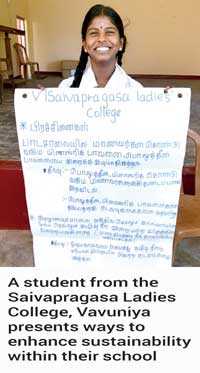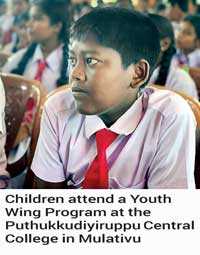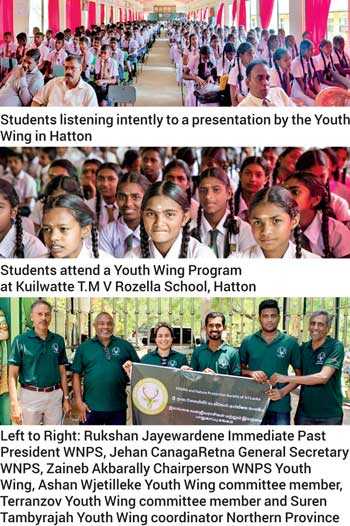Friday Feb 27, 2026
Friday Feb 27, 2026
Thursday, 18 July 2019 01:01 - - {{hitsCtrl.values.hits}}
By Piyumani Ranasinghe
Schooling of conservation awareness of wildlife and nature that transcends a traditional classroom environment is now a necessity, as opposed to a choice. This is due to the perennial struggle in striking a balance between the environment and development. 
In a world where rational science education is the pivot of a young person’s sense of understanding of the world; education for conservation strives to balance rationality with sensitivity and empathy towards the environment they live in. Schooling of conservation awareness bears many fruits in the long run, by not only creating a space for experiential learning that transcend classrooms, but equally developing critical and creative cognitive skills fundamental to inculcate a sense of responsibility in future leaders of a nation.
The Wildlife and Nature Protection Society (WNPS), the oldest environmental society in the country, established its Youth Wing in 2018 with the goal of inspiring young conservation heroes in Sri Lanka. Since its initiation, the Youth Wing runs a nation-wide program with education for conservation placed at its centre. The program covers key environmental issues and raises awareness of the need for conservation amongst schoolchildren from various parts of the island.
Cultivating an eco-centric mindset
The purpose of conservation education is to enable younger generations to comprehend the value of wildlife and nature and prompt them to actively take part in protecting the natural environment. While it envisions a wholesome experience of sensitisation, it also aspires to cultivate empathy in children to care for wild animals as well as nature. Philosopher and pedagogical thinker Johann Friedrich Herbart, once pointed out that promoting rational unilaterality in education is dangerous to humankind as it is often one-sided.
Conservation education looks into developing three main capacities in the context of nature: Firstly, developing the ability to critically examine oneself in the context of one’s environmental heritage; secondly developing capacities to perceive one’s self as an organism mutually and perennially interconnected to the natural environment; and lastly the ability to empathise with nature and to put oneself in the shoes of mother nature.
In amalgamation, these capacities cultivate an eco-centric mindset in a child, surpassing ego-centric and individualistic rationality. Cultivation of an eco-centric mindset undoubtedly leads to sustainable development as the younger generations develop a deeper understanding to care for the world they live in.
The Youth Wing and its mission
In line with this goal of cultivating an eco-centric mindset amongst the young generations of Sri Lanka, to strive for a more environmentally sustainable tomorrow, the Youth Wing travels across the country raising awareness on five issue areas ranging from: Human-Elephant Conflict (HEC); awareness of leopards as iconic species; deforestation and its effects; recycling and pollution including ocean pollution; to the latest addition in 2019, climate change. Funded by the National Development Bank (NDB), the initiative predominantly focuses on experiential learning aimed at heightening the enthusiasm and imagination of school children, where in addition to a lecture in the schools, the Youth Wing conducts various project activities with the school and organises immersive experiences such as field trips and poster competitions. 
In 2018, nine schools in Colombo and two schools each in Lunugamvehera, Udawalawe, Wilpattu and Galgamuwa participated in the program, where the children had the opportunity of visiting national parks and an elephant transit home, experiences that were completely novel to them. The idea was to foster an environment of learning outside the classroom to generate new understandings and interactions with nature.
In 2019, the program received the official endorsement of the Ministry of Education due to its pragmatic significance, which is not only a stepping stone for the program, but is an indispensable opportunity to the young Sri Lankan nation as a whole, as it opens up our education system to converse on environmental issue areas that shape our common future.
In this context, the youth wing has conducted workshops with over 30 schools from Jaffna, Kilinochchi, Hatton as well as Mullaitivu by July 2019. In Jaffna, the program covered 10 schools where the lectures also highlighted the significance of coastal conservation. In Hatton, 10 schools participated in an interactive lecture which highlighted the importance of leopards in Sri Lanka.
Commendably, the program is inclusive of diversity in terms of region, language, ethnicity as well as special needs. In Kilinochchi, the Naffield School for the Deaf and Blind participated in the program where the awareness session and interactive program was interpreted in sign language as well. 
The journey continues: Next generation conservation heroes in the making
The significance of the Youth Wing program is the way in which it seeks to sensitise students to a particular issue that affects their immediate environment and communities in addition to providing an overall understanding of the five key environmental issue areas mentioned above. This often prompts conversation and sharing of personal experiences amongst the student body, especially in terms of their respective understandings of the issue and their visualisation of solutions to tackle issues.
In Jaffna for example, a group of students were so inspired by the session; they proposed a nation-wide petition against pollution to pressurise authorities to take action. In Hatton, almost all participants recognised improper waste management as one of the largest environmental issues in the country. In fact, Ganesha Tamil Maha Vidyalaya in Rozella recommended the implementation of a national 3R system (reduce, reuse and recycle) at least at a school level to find sustainable solutions to the issue of garbage disposal. It is vital to understand that these dynamic responses emanate from the next generation of environmental heroes of Sri Lanka.
Inspired by the 16-year-old Swedish activist Greta Thunberg, there have been an array of instances across the globe, where young school children have stepped on to the streets to demand action against climate change. Although Sri Lanka is yet to witness a wide-spread movement of this nature, education of conservation is indeed a catalyst in the longer run, which will prompt younger generations to actively advocate against environmental degradation.
Children are becoming advocates and agents of change in pressurising policy makers to implement tangible and effective measures to resolve environmental issues at hand. As with the WNPS Youth Wing program, now the task is to cultivate humanity, passion for the environment and ability to take initiative in their respective communities to tackle common environmental problems. It will also enable younger generations to rethink the future in a different lens which is not wholly based on economic rationality and consumerism.
(The writer is a graduate of International Relations from the University of London and holds a LL.B. from University of Peradeniya. Views expressed are her own.)